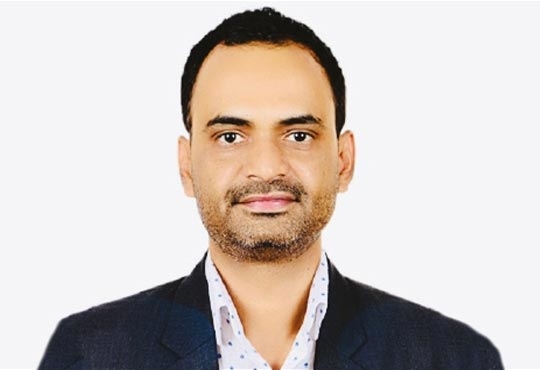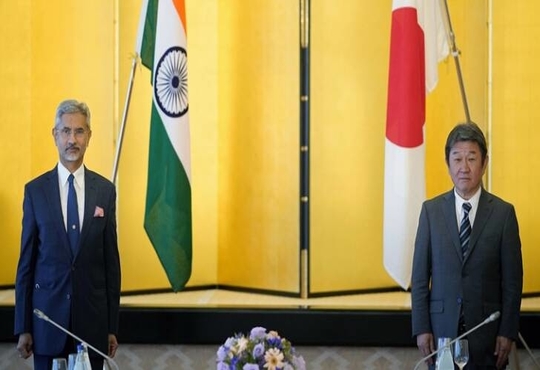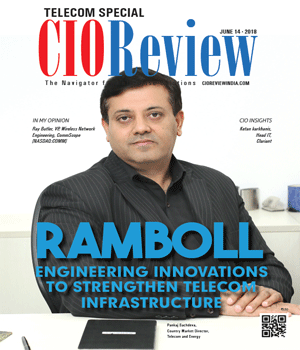
India, Japan Finalise Landmark Pact to Enhance Cooperation on 5G Tech
CIOReviewIndia Team | Thursday, 08 October 2020, 09:05 IST
 A historical landmark cyber-security agreement concluded between India and Japan, which is subjected to providing enhanced cooperation on 5G technology, artificial intelligence and critical information infrastructure. India and Japan took a vow to further broad-base their joint efforts for ensuring a free and open Indo-Pacific.
A historical landmark cyber-security agreement concluded between India and Japan, which is subjected to providing enhanced cooperation on 5G technology, artificial intelligence and critical information infrastructure. India and Japan took a vow to further broad-base their joint efforts for ensuring a free and open Indo-Pacific.
The Ministry of External Affairs (MEA), when the meeting concluded in Tokyo, said that the two sides have come to a pact, through which it will promote cooperation in 5G technology, the Internet of Things (IoT), Artificial Intelligence (AI) and important aspects of cyberspace.
This deal comes when India is under cyber threats from China, when India has banned 100+ mobile apps that linked the Chinese industry, it was followed after the bitter border standoff between the two countries in eastern Ladakh.
A meeting of the union cabinet, chaired by the Indian Prime Minister Shri Narendra Modi, approved this agreement with Japan.
After the finalization between the External Affairs Minister S Jaishankar and his Japanese counterpart, Toshimitu Motegi, an announcement was made that Japan agreed to lead in the connectivity pillar of the Indo-Pacific Oceans’ Initiative (IPOI). An Indian-backed framework, IPOI aims to make meaningful efforts for creating a safe and secure maritime domain in the Indo-Pacific – a surrounding where China is expanding its military assertiveness triggering global concerns.
Regarding this, Jaishankar tweeted saying that further expansion of India-Japan collaboration in the third countries is bestowed with a focus on the development projects were also discussed in the meeting.
MEA said, “Recognising the increasing role being played by digital technologies, the two ministers highlighted the need for robust and resilient digital and cyber systems and in this context, welcomed the finalization of the text of the cybersecurity agreement.”
It added, “The agreement promotes cooperation in capacity building, research, and development, security and resilience in the areas of Critical Information Infrastructure, 5G, Internet of Things (IoT), Artificial Intelligence (AI), among others.”
India and Japan’s cooperation on 5G technology came in the backdrop of growing reluctance by a significant number of countries, globally allowing Chinese telecommunications giant Huawei to roll out 5G services in their native lands.
The United States has already banned Huawei as security concerns raised, and Washington has been creating pressure on other countries to restrict the operation of the Chinese telecom major.
A next-gen cellular technology, 5G allows download speeds to reach 10-100 times faster than the present 4G LTE networks.
In a statement, released after the ending of the cabinet meeting, said that the cyber-security pact will be providing for sharing strategies and best practices for promoting the integrity of the supply chain of the information and communication technology (ICT) products.
The statement said, “India and Japan commit to an open, interoperable, free, fair, secure and reliable cyberspace environment and to promote the Internet as an engine of innovation, economic growth, and trade and commerce that would be consistent with their respective domestic laws and international obligations.”
The pact will enhance the cooperation in the fields of cyberspace and emerging technologies, providing protection to critical infrastructure and share information on cybersecurity threats and malicious activities, delivering best practices to counter them.
Jaishankar and Motegi, in the course of the 13th India-Japan foreign ministers' strategic dialogue, pointed on a broad range of areas, which include maritime security, trade and investment, manufacturing, connectivity, and infrastructure and reform of the United Nations. It is said by the MEA.
The cabinet discussion emphasized more on the Indo-Pacific areas.
MEA said, “They emphasized that a free, open and inclusive Indo-Pacific region must be premised on diversified and resilient supply chains; and in this context, welcomed the Supply Chain Resilience Initiative between India, Japan, Australia and other like-minded countries.”
The two ministers also concurred that the Indo-Pacific has acquired greater salience at present and underscored the need for India and Japan for working together to benefit the region.
MEA said, “Reaffirming the similarities in their respective Indo-Pacific visions, that are based on rule of law and respect for sovereignty and territorial integrity, the Japanese side agreed to be the lead partner in the connectivity pillar of the Indo-Pacific Oceans’ Initiative and jointly take both countries’ respective visions for the Indo-Pacific forward.”
The Honourable Prime Minister, last year, at the East Asia Summit in Bangkok, proposed of setting up of the Indo-Pacific Oceans’ initiative for conservation and sustainable use of the maritime domain and make it meaningful through efforts for creating a safe and secure maritime domain.
MEA said, “In the talks, the two ministers exchanged views on regional and global issues of mutual interest and agreed that the strong and enduring partnership between the two countries will play a pivotal role in overcoming challenges posed by the COVID-19.”
A statement released by the Japanese foreign ministry said that the two ministers reaffirmed the importance of implementing Japan-India cooperation in third countries like ASEAN and Southwest Asian countries, making steady progress on the high-speed rail project.
The statement also referred to the signing of note exchanges in late August for Japan’s COVID-19 measures for India, which include a 50 billion yen emergency assistance loan and a 1 billion grant aid allotted to the medical equipment.
In the statement, it was also included that Motegi expressed his hope that the assistance will contribute to developing the health and medical systems of India, including the COVID-19 response.
The Japanese foreign ministry said, “Jaishankar and Motegi exchanged views on cooperation for realizing a “free and open Indo-Pacific” and affirmed their intention to continue boosting the bilateral cooperation, including the IPOI promoted by India.”
Further went on saying, “The ministers exchanged opinions regarding the issue of North Korea. Minister Motegi asked for understanding and cooperation towards the early resolution of the abductions issue and Minister Jaishankar expressed his support.”
It concluded by saying that the two countries will cooperate toward realizing UN Security Council reforms as soon as possible.
CIO Viewpoint
Big Data and the Big Opportunities
By Bipin Kumar, Head - IT & Projection at Cinèpolis India
Optimized Networks For An Agile Workplace
By Steve Miller, CIO, Steelcase
The Hidden Revenue Potential in Mobile Big Data
By Manuel Stopnicki, CTO, Tektronix Communications
CXO Insights
Unlocking Efficiency: The Future of Smart...
By Ganesh Lakshminarayanan, CEO – India, Airtel Business
Data Center Modernization: Transforming the...
By Rajesh Tapadia, COO, Nxtra by Airtel
Revamping Workflow In Pharma Industry With...




.jpg)
.jpg)




